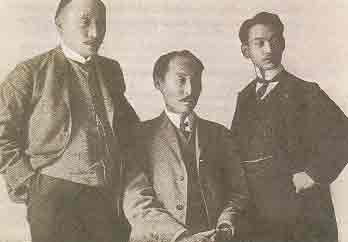Hari-Kiri at the Hague? April 4, 2014
Author: Beach Combing | in : Modern , trackbackIn 1907 three Korean representatives travelled to the Netherlands to persuade the powers meeting at the Hague Peace Conference to revoke Japanese hegemony over Korea. Their leader was Yi Jun (aka Ri Jun, Yi Chun, pictured left) and he and his two colleagues were devastated to learn, upon arrival, that they would not even be allowed to attend the conference as Japan was from then on to represent Korea in international affairs. The proud Yi Jun could not tolerate this slight. He appeared in front of a selection of western diplomats and, taking his sword, he committed hari-kiri as the effete westerners watched on horrified, a martyr to the cause of a free Korea. Yi Jun’s death was later ‘celebrated’ in film, in particularly in An Emissary of No Return (Doraoji annun milsa) and has entered the patriotic imagination of the Koreas, both north and south.
There is only one problem with the story as recounted above and that is that Yi Jun did not commit hari-kari in the Hague or, indeed, anywhere else. Now to facts. Yi Jun was a Korean diplomat and patriot of rare ability and he did manage the last political attempt to prevent Japanese rule in the peninsula: with all the hell and heartbreak that would stem from that rule, not least twenty million Koreans to this day trapped in possibly the most evil regime on the planet (and that’s saying something). He was turned away, with his two colleagues, at the very doors of the Peace Conference, a devestating moment after travelling for two months across Russia to make the case for his nation. He also, it is true, died in the Hague. He was found dead in his hotel room – which is now a peace museum dedicated to his memory.
His death is, of course, the messiest part of the whole story. For those who forego the hari-kiri story there are essentially three possible explanations: first, the Japanese assassinated him; second, he committed suicide; or, third, he died of natural causes perhaps provoked by overwork in the cause of his country. Korean sources repeat again and again the ‘fact’ that Yi Jun committed suicide. However, there does not seem to be any good western source for this and as the event did take place in the Netherlands…. Yi Jun came, of course, from a culture where suicide was seen as honourable and where it also existed as a form of protest: many Korean officials killed themselves in 1907 rather than accept Japanese rule. Any proof one way or the other: drbeachcombing AT yahoo DOT com Perhaps a good source from Holland? Oh, and if anyone has the hari-kari scene I’d love to put it up. North Korean cinema is too bad to be wasted…
RIP Yi Jun
24 April 2014: Louis writes ‘According to this website (only in Dutch unfortunately) the papers in the Netherlands were divided on the cause of death. One says it was because of complications from an operation on an abces on his jaw, another one because of an operation on his cheek, and a third one mentions that he was already sick for some days. Also, him being a Korean, and anti-Japanese to boot, I seriously doubt that he would have chosen the very Japanese way of suicide that Hara Kiri (or, more precise: Sepuku) is. The website also mentions that they could not find any contemporary medical details. It might be that there is some dossier, but if there is, it is probably buried somewhere deep in the dungeons of the Municipal Archive in The Hague. Ashley writes in ‘I studied TaeKwonDo and taught English in Korea for a while so I know some of these stories in an anecdotal kind of way. The US apparently had made assurances to Korea over the years that the US would protect them from Japan’s imperial insistences. And then stopped answering calls after telling Japan privately, “She’s all yours!” Durham Stevens paid for that, apparently. The Battle of Tsushima figures strongly into that period and the perception of Japan as a serious power.’ Thanks Ashley and Louis!



